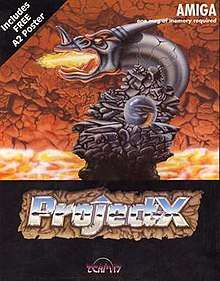Project-X
Project-X is a horizontally scrolling shooter for the Amiga released in 1992. It was developed and published by Team17. The game resembles Konami's side-scrolling shooter games such as Gradius, Salamander and Parodius. It was ported to MS-DOS.
| Project-X | |
|---|---|
 | |
| Developer(s) | Team17 |
| Publisher(s) | Team17 |
| Composer(s) | Allister Brimble |
| Platform(s) | Amiga, MS-DOS, Amiga CD32 (special edition) |
| Release | 1992 |
| Genre(s) | Scrolling shooter |
| Mode(s) | Single player, multiplayer |
Plots
Taking place many years in the future in colonized space, military scientists have disposed of countless, defective military droids on an un-colonized terrestrial planet called Ryxx. The droids eventually become sentient and, by way of revenge, start an attack against mankind, using a station to continually create more war machines. It is the player's mission to undergo Project X and eliminate the droid forces.
Gameplay
Players control a spacecraft of their choice, battling hundreds of alien ships. Various power-ups, numerous in the first level but increasingly rare afterwards, permit an exponential increase of the spacecraft's seven different weapons (Guns, Buildup, Side Shots, Homing Missiles, Plasma, Magma, and Laserbeam).
The game is composed of five levels. Many players never completed the second one (which had a very difficult ending), and most of the rest never went past level three. When Team17 realized this, they released Project-X SE on Amiga CD32, a special edition with the difficulty toned down. It was released as a budget game.[1] A hack for the original game to enable the player to skip levels by holding down the fire button and pressing the escape key was also distributed on the coverdisks of several Amiga magazines.
Reception
According to Next Generation, Project-X was immensely successful in Europe, but only sold in moderate numbers in the U.S.[2] Amiga Computing called it one of the best shooter games for that platform at the time, both for its technical excellence in graphics and sounds, and for its difficult and interesting gameplay.[3]
Legacy
The game was followed by a PlayStation-only sequel, titled X2.
The game was parodied in one level of Team17's own Superfrog, as Project-F (with the 'F' presumably standing for "Frog"), even going as far as using a remixed version of the original game's theme tune.[4]
References
- Tenas, Ignacio Rufas (2015). Catálogo en Color de Juegos para Commodore Amiga: Volumen 2. p. 206. ISBN 9781904994473.
- "In the Studio". Next Generation. No. 23. Imagine Media. November 1996. p. 17.
- Maddock, Jonathan (June 1992). "Project-X review". Amiga Computing. 49. Retrieved 7 August 2017.
- Guinness world records 2009: Gamer's edition. Guinness World Records Ltd. p. 152. ISBN 9781291004427.